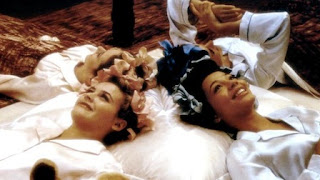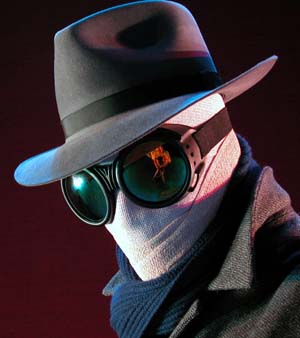Hello,
A second week of reading has come and gone! Let's launch right in. So first thoughts . . .
How odd . . .
Love's Labours Lost is one of Shakespeare's truly original plays. For a comedy, it seems relatively standard at first. Sexual tension, boys vs. girls wit, courting, misunderstandings, strategies discovered and foiled, the works. But There are a few key points that make Love's Labours Lost quite unique.
The Opening Circumstance
We'll begin with something simple, yet important. The opening circumstance. King Ferdinand and his three companions Biron, Longueville, and Dumaine have all sworn off women (Biron unwillingly) so that they can study in the Greek philosopher fashion for a short (or long, depends on when you ask and how in love they are) years. Even Though this may not seem like a big deal, it puts the men in a spot for certain ridicule as the King must soon welcome the Princess of France. Over the course of three years, (in this case sooner rather than later) a circumstance would have arisen which would force the king to be neglectful because of his slightly misogynistic oath. So, no matter what decision is made, he will either cross his word by breaking his oath or be neglectful and petty in his treatment of women, because of it. Also, most of the play takes place outside, which is traditionally symbolic of freedom, and sexual tension. So take a wild guess with this plays plot.
 |
| This is Biron . . . |
Shakespeare writes Love's Labours Lost with an interesting back and forth narrative, which jumps between two parties till they are brought into the same space at the end. The division lies along a class distinction. In one group is the King and his lords who are attempting to court the Princess and her ladies. In the other group are Costard (a crude clown), Armado (a Spanish braggart) and Mote (his page), and Jaquenetta, a "wench" whom Armado has fallen in love with and Costard has probably messed with. Eventually, the lower class/varying class group is joined by the more learned Holofernes and Sir Nathaniel.
This juxtaposition is important because it works to both elevate and lower the higher class. For example, both Armado and Biron employ Costard to deliver their love notes to their respective ladies. But, a mix up occurs and both are equally ridiculed regardless of class. They both use inflated and ridiculous language, making them seem more similar and absurd than is cared for in the higher classes. On a different note though, the beautiful poetry and crisp prose of Biron and his companions is sharply contrasted by the low and crude prose of Costard and his friends. Another interesting difference is Armado's willingness to work for love in contrast to the lord's hesitancy, which leads us into our next topic.
Trust, Constancy, and Bromance
So, funniest scene ever: Biron is in the library having just written a sonnet to Rosaline. Then the King enters and Biron quickly ducks into hiding. The King then incriminates himself by breaking his oath by professing his love for the Princess. Soon Longueville enters and the King quickly hides, and Longueville likewise perjures his oath by professing his love for Maria. And finally, Dumaine enters and once again, with Longueville hiding, Dumaine is found crossed in his oath as he is in love with Catherine. It's really quite hilarious as each ridicules the previous to find out that he himself is found out. Even Biron eventually confesses, and they toss aside their broken word as a "too bad, at least we tried . . . right?"
The women don't take their forsworn nature so easily though. Neither do they accept their "group-attack" strategies. Thus begins the bantering wit and humiliating courtships, where, in fact, the women always top the men by being a step ahead, unwilling to trust that their suitors actually love them or would be willing to leave their bachelor/brotherhood lifestyle for matrimony. It's too bad that the play is spent with love-struck men trying in vain to woo disbelieving women but hey, hence the title Love's Labours Lost. Besides if a bunch of guys who wanted nothing to do with me suddenly became romantically interested with each girl in my party (conveniently not falling for the same girl) then I might be a trifle skeptical too. Even so, it is the back and forth wit, whether the speakers are disguised or not, that brands itself as one of Love's Labours Lost's most famous markers, but it also shows an interesting perspective regarding female confidence, requirements, and independence that we will touch on in the next few sections.
Sexuality and Language
The language of Love's Labours Lost is almost flagrant in its undisguised brilliance. The language and sheer mass of sexual puns not only set apart the play though, but also the women. First off, the Princess and ladies in waiting can mince words with the greats-of-subtle-yet-blunt-meaning. They have no problem battering their young men with sexual insults, jokes, or witticisms. Frankly, these women are super sexually and verbally confident. This confidence does cost a price though. The aristocratic characters will often banter with characters like the low-class Costard, effectively lowering their own station and distance in the act.
The men of both classes also joke about sexuality, mostly among themselves and especially when Costard is speaking (in which circumstance bodily functions, feces, and genitalia is often the topic of discussion). This creates a weird scatological and almost homoerotic sub-theme that also adds to the unlikely nature of the brotherhood and sisterhood disassembling for the sake of a marital possibility that the women are suspicious of anyway. And on top of that, the women are firmly planted in their independence to be so shaken by something so unpromising and ridiculous. Even so, homosexuality is simply not a part of Love's Labours Lost, but the reminder that Shakespeare's sexual sense of humor is expansive enough to include both genders, is everywhere. This brotherhood/bromance tendency leads us into the women's final requirement and unexpected ending.
An Ending without a Marriage
So the ending is really not so unexpected due to the title. But even so, it is incredibly unusual considering Shakespeare's comedic pattern. The comedy = Everyone always gets married! Even if they've known each other for a freaking day. But, this could not have happened in Love's Labours Lost. In a world where love is a game reality simply had to step in. So, death enters the picture in the form of the King of France passing away. With the sudden news, the Princess and her ladies pack up leaving no time left for the King and his lords to convince them of their love. Essentially the ladies were like: "Why should I trust you? You're already forsworn bro!" So, in order for the men to prove their love each lady requires a year's time for mourning and for the respective lover to fulfill whichever occupation the lady assigned (for Biron it is to jest in a hospital). The lords are hesitant as to the length of time but each agrees in turn while Armado expresses his willingness to plough for three years for Jaquenetta's love. An interesting contrast.
Biron calls attention to this unconventional ending by saying, "Our wooing doth not end like an old play. / Jack hath not Jill. These ladies' courtesy / Might well have made our sport a comedy." The King replies: "Come, sir, it wants a twelvemonth an' a day, / And then 'twill end." And in a sort of omen Biron ends with, "That's too long for a play."
Extra Thoughts
 So did you notice the occasional comments about Ethiop's and general blackness? Well if you did then you're probably wondering if Rosaline is Black. While multiple adaptations have portrayed both a lord and a lady, sometimes neither being Rosaline, as Black, and other adaptations as only Rosaline being Black, while still others with no Black characters, the question is still up for debate.
So did you notice the occasional comments about Ethiop's and general blackness? Well if you did then you're probably wondering if Rosaline is Black. While multiple adaptations have portrayed both a lord and a lady, sometimes neither being Rosaline, as Black, and other adaptations as only Rosaline being Black, while still others with no Black characters, the question is still up for debate.This question originates in tensions relating to the foreign setting, and Biron and the lord's comments regarding Rosaline's coloring. For starters, Navarre is in Spain and the ladies are from France. The original occurrence bringing the two parties together was war and debt (making the seriousness of the lord's broken vow make a little more sense, as well as heightening the likelihood that a character, whether Rosaline or not, would be foreign as well as of a different ethnicity). Apart from that, Biron complains of her black eyes at first. And the King teases Biron saying: "By heaven, they love is black as ebony. . . . / Biron: No face is fair that is not full so black. / King: O paradox! Black is the badge of hell. . . . / Biron: And therefore is she born to make black fair."
Though the lines remain ambiguous since Biron at one point calls Rosaline pale, leaving the audience to wonder if she is pale with black hair and eyebrows and eyes, making their exaggeration one of love's antics, or if she is actually Black. But either way, it gives an opening to introduce diversity into the play and into the most central couple at that. Maybe echoing here are the remnants of Shakespeare's "dark lady."
-Natalie Cherie






